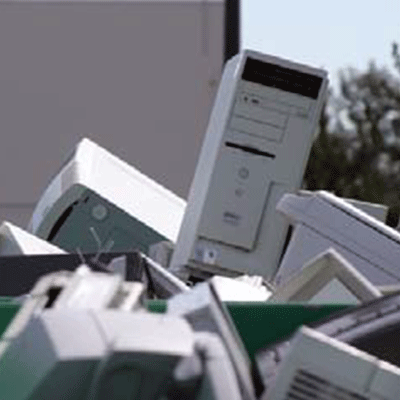 E-Cycle Wisconsin Program Boosts E-waste Recycling
E-Cycle Wisconsin Program Boosts E-waste Recycling
Jennifer Semrau, recycling specialist for Winnebago County, Wis., and her colleagues field calls nearly every day from residents who know their old computers and TVs don’t belong in the garbage, but are less certain about what should be done with those or any of the other electronic devices covered by 2009 Wisconsin Act 50.
“Of course, I let them know we provide electronics recycling,” said Semrau.
“Winnebago County strives to provide a one-stop shop for residents who want to drop off various waste and recyclable materials and having a drop off for electronics makes sense toward this goal. We want to keep these materials out of the landfill.”
E-waste Collection Swells under New Law
With the passage of Act 50, Wisconsin became the twentieth state to pass an electronics recycling law, according to the Electronics TakeBack Coalition. The law established E-Cycle Wisconsin, a statewide, manufacturer-funded program to collect and recycle certain electronics from households, K-12 public schools, and Milwaukee Parental Choice Program schools. In September 2010, these devices, such as TVs, monitors, computers, printers, fax machines and the like, became subject to landfill and incineration bans.
Prior to the ratification of the state’s Act 50, Brown, Outagamie, and Winnebago counties already had e-waste collection programs in place to provide their residents with environmentally responsible disposal options for discarded electronics. What had been voluntary on the part of residents became mandatory and with it came significant increases in e-waste volumes for these counties.
Chris Blan, solid waste technician for Brown County, indicated that the county, which is the state’s fourth largest and includes Green Bay, collected 150,000 pounds of e-waste in 2008.
From July 2010 to June 2011, the first full program year following the introduction of Act 50, the amount of e-waste the county took in ballooned to about 377,000 pounds. The county collected nearly 341,000 pounds of material in the second year of the program.
Winnebago County, with a population of 166,994 residents, collected 38,267 pounds of e-waste in 2007, according to Semrau. This was also the first year the county introduced an ongoing electronics recycling program. The amount of e-waste collected continued to grow moderately each year until the provisions of Act 50 took effect. The number of pounds collected by Winnebago County jumped to 278,839 in 2010. The next year, the county collected over 20,000 pounds more, for a total of 298,995.
What They Need, When They Need It
Electronics recycling is just one of several services these counties provide to their residents and having enough staff and space are always challenges. Brown, Outagamie, and Winnebago counties are able to provide their combined 591,696 residents with convenient, low-cost electronics collection and recycling that is Act 50 compliant in part because of their relationship with Sims Recycling Solutions.
Sims began working with the Wisconsin counties in May after winning a joint RFP based partially on price, but also on the company’s ability to handle the anticipated volume of e-waste and process that e-waste responsibly. Representatives from each of “the counties toured Sims to see firsthand how electronics are recycled,” said Semrau. “We felt that Sims’ combination of price, experience, qualifications, end-market policies, and references made Sims the best choice.”
For Outagamie and Winnebago counties, Sims provides a 53-foot trailer to store the e-waste collected from residents. Brown County has on-site storage for collected equipment, so Sims dispatches a trailer when the county is ready for a pickup. Sims also provides the three counties with Gaylord boxes, shrink-wrap, and pallets to securely store all material until it is picked up by Sims for processing.
Just as important to the success of these programs, according to Blan and Semrau, is Sims’ willingness and ability to accept commingled electronics and process more difficult items. This includes TVs, which make up about 70 to 80 percent of Brown County’s material. “Sims does not require electronics to be sorted. This is important because Winnebago County collects material in a semitrailer,” said Semrau. “We don’t have the room or staff to sort electronics into different categories.”
Christine Miller, Outagamie County recycling coordinator, appreciates Sims’ willingness to accept nearly any device with a cord. “We try to adhere to collecting the covered electronic devices included in the E-Cycle Wisconsin program, but sometimes we’re given items not covered. Sims allows all e-waste to be collected at no charge to us.”
Four months into the 14-month contract, Winnebago’s Semrau is pleased. “In working with Sims, Winnebago County has a competent, efficient service provider that meets our needs with minimal effort on our part,” said Semrau. “Sims provides timely service and supplies. This is a simple act, but so critical to our operation. As a manager of several programs, I don’t have a lot of time to devote to our electronics recycling program. Knowing that a simple call or email to Sims will get me what I need is appreciated.”
